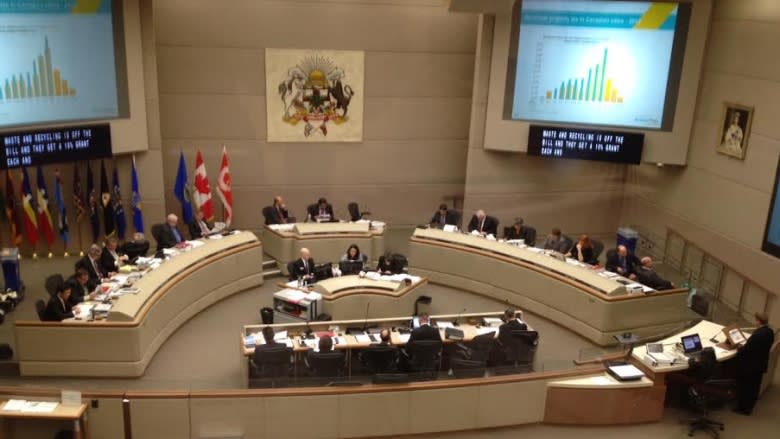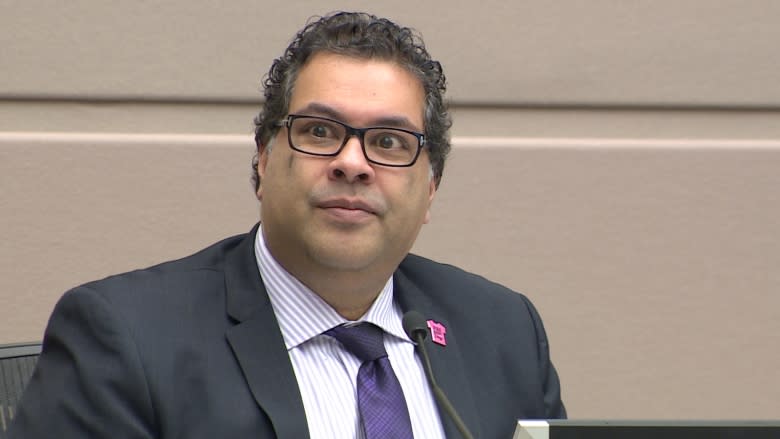Calgary council to name integrity commissioner and ethics advisor
City council is now expected to name Calgary's first integrity commissioner in early April.
And in a surprise move, it's also expected to appoint an ethics advisor — which leads some to question what's going on at city hall.
Although several council members said as recently as Friday the names would be revealed at Monday's strategic council meeting, the mayor's office later said the contracts are not quite finalized and the formal announcement is now expected early next month.
The commissioner — a first for any city or town in Alberta — will have the power to investigate conflict of interest allegations by city council members as well as any complaints of misconduct.
The ethics advisor will advise council members on questions about city council policies or ethical situations they may find themselves in.
But aMount Royal University political studies professor says creating two separate positions is unusual and could point to deeper problems at city hall.
"I think it's causing people to question whether there's something going on that needs to be looked at rather than providing assurance that things are being done well and we're just going to try to do better," said Lori Williams.
How integrity commissioner could help
City council voted last year to hire an integrity commissioner, a position used in a number of Ontario municipalities.
Coun. Brian Pincott said having someone to bounce things off is a good idea because right now, there is no one designated to help with that.
"You can ask your colleagues but generally, it comes down to a personal judgement," said Pincott.
For conflict of interest questions, the politicians can turn to the city's law department. But if it isn't covered by the Municipal Government Act, elected officials are on their own.
Under the Act, elected officials cannot take part in a vote if they have a pecuniary or financial interest in a matter. Beyond that, Pincott said it's all about personal judgement — and that can vary from person to person.
For example, he was given an iPad in 2014 by city-owned Enmax. Pincott is a council representative on the utility's board and he needs the device to access company servers. Even though it was necessary for his Enmax work, Pincott chose to err on the side of caution and declare the iPad as a gift.
There were media articles about the iPad showing up on the city council gift registry, something he says he was criticized for. But he knew he might also be criticized if he had not reported it.
Coun. Ward Sutherland said elected officials sometimes need advice on work matters.
Early in his time in office, Sutherland recalls he had a question about city procedures but the law department couldn't help. He decided to hire a lawyer at his own expense to get guidance.
"I don't think we should have to pay with our own money to get advice to do our job and this [integrity commissioner] will help take care of it," said Sutherland.
Some slam move as unneeded 'babysitter'
Although council backed the creation of an integrity commissioner, not everyone around the table is keen.
Coun. Sean Chu accepts the new watchdog position. But he doesn't like it.
"I don't think we need it, to start with."
He also worries about the cost.
When council voted to create the job, Coun. Andre Chabot described an integrity commissioner as nothing more than a "babysitter."
He said the city already has an auditor to handle such matters.
Auditor lacks independence
But there are issues with the present system. The auditor, currently Kathy Palmer, ends up investigating her bosses (city council) when she receives a complaint against one of its members.
Unlike an integrity commissioner, Palmer submits her reports only to city council and that's where it gets awkward.
As an employee, the auditor is not independent of council's control and she has no power to sanction any wrongdoing she uncovers. Only council can sanction itself.
And if council decides to never release her reports — which has happened — there's nothing she can do about it.
Current system needs group consensus
Mayor Naheed Nenshi has spoken publicly about three substantiated allegations against members of city council. But no details have ever been publicly revealed.
The mayor has also said he has received complaints about councillors getting "blotto" at public events and that councillors have used what he called "illicit substances" in their workplace.
He refused to provide any more detail and some of his council colleagues demanded he apologize for bringing up what they called rumours.
Nenshi called the current system for dealing with misconduct "imperfect." The mayor isn't the boss of council. He may be elected citywide but he is just one voice of 15.
It takes the group to decide to sanction someone around the table and the punishments are limited. It can vote to strip someone of their job chairing a committee. But it can't kick them off council.
An integrity commissioner — beyond being handed the power to investigate complaints — will only have one tool at his or her disposal. Their investigations will produce reports that can be publicly released.
'Looks like there's a problem'
Williams, the Mount Royal political studies professor, wonders why council has decided to create two positions.
In Ontario, municipalities have chosen to have integrity commissioners who handle both the advising of elected officials and the investigations of complaints.
She's looking forward to seeing how the two jobs are defined. She wonders whether council is splitting these responsibilities because it knows something.
"It looks like there's a problem that they're trying to fix here. We don't quite know what it is that the problem is," said Williams.
Williams said without the power to sanction, the integrity commissioner only has the ability to shame by putting information into the public arena.
"You still don't have the ability to in any meaningful way sanction anybody who has fallen afoul of expectations or codes of conduct or principles of behaviour," said Williams.
The one advantage is it may put more information into the public's hands about elected officials. Transparency would come through the commissioner's reports whereas right now, the city auditor investigates and no one knows what's up.
Even when there is — as the mayor says — a "substantiated complaint," no one finds out who allegedly did what or if there was even so much as an apology offered.




